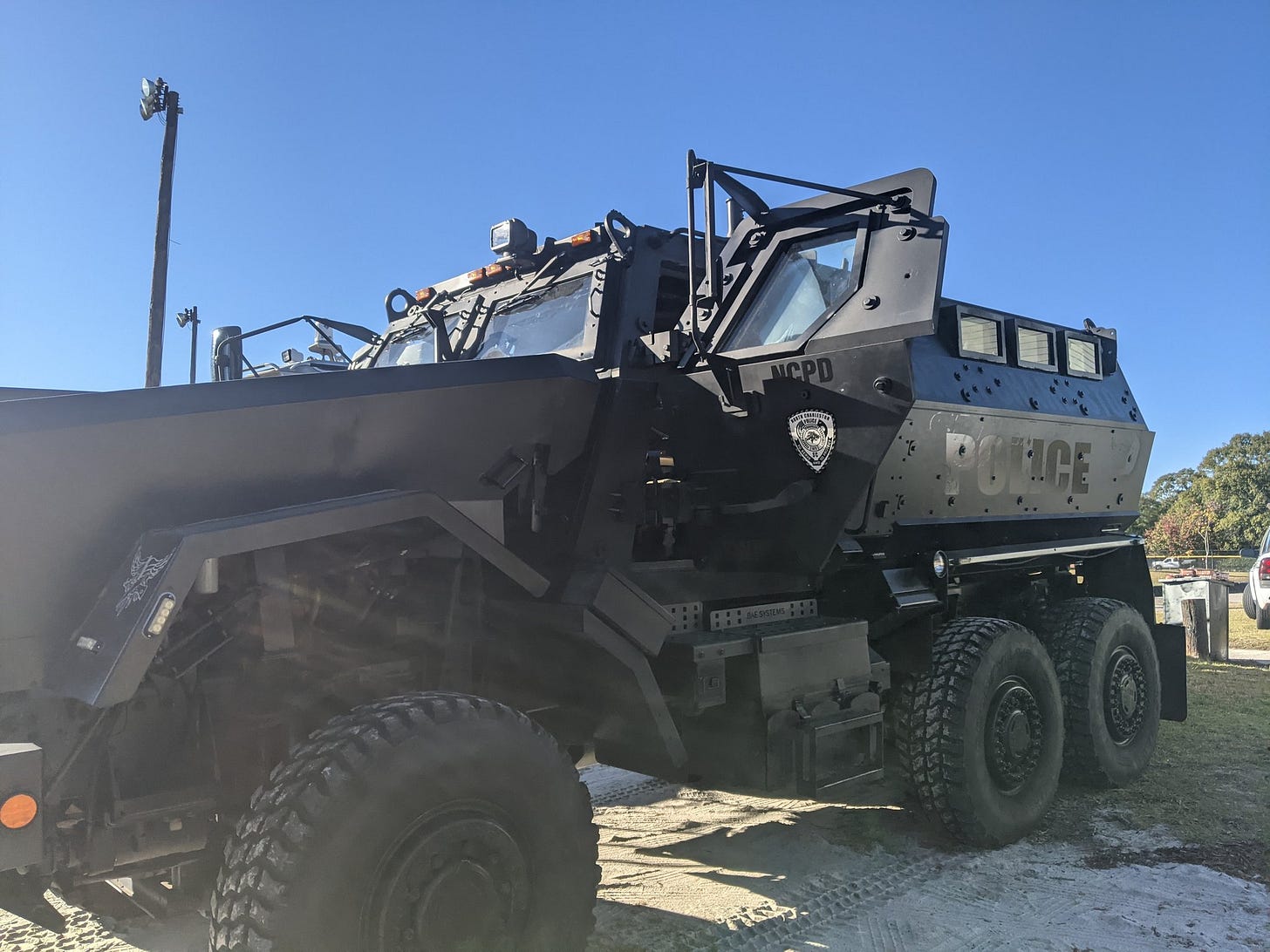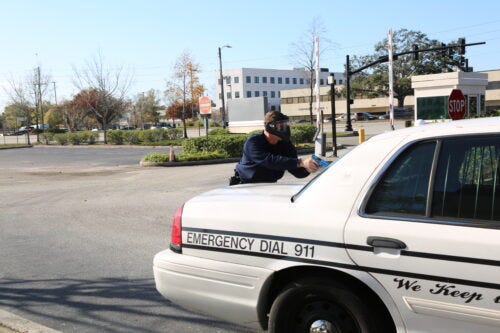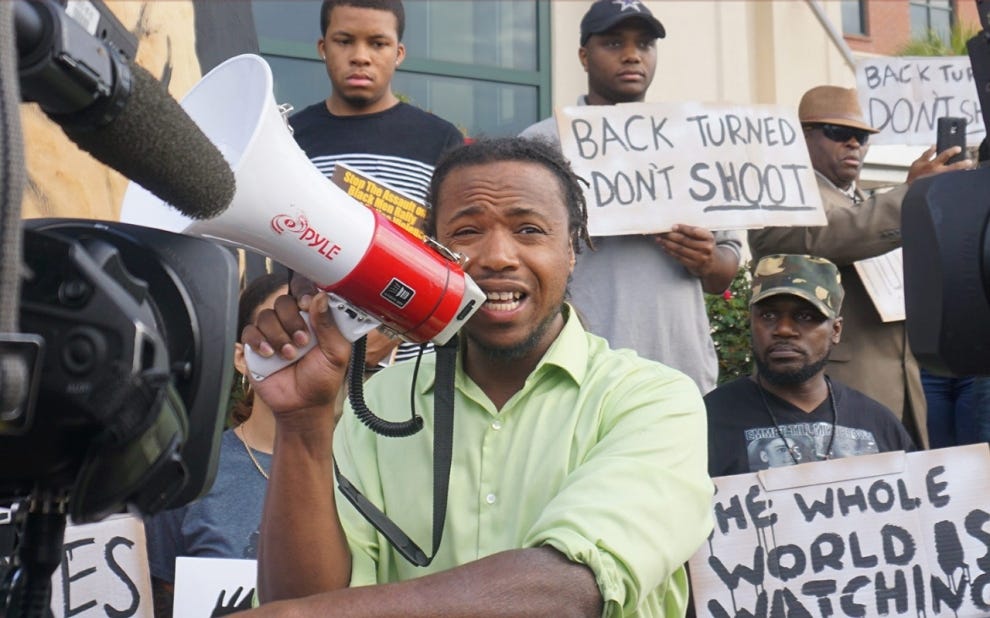Where police reform goes to die
8 years after Walter Scott's murder, North Charleston police remain immune to democratic restraint

Standing in the field where a North Charleston police officer murdered Walter Scott, you can see the orange facade of an AutoZone a block away on Remount Road.
It is a cruel coincidence that Officer Michael Slager initially stopped Mr. Scott for a broken brake light in the parking lot of one auto parts store, across the street from another auto parts store. Scott’s brother has said in interviews that he was on his way to get that brake light fixed when it all went down. He nearly made it.
It’s been almost 8 years since Slager shot Scott in the back as he tried to run away, and I can’t say much has changed here. There was supposed to be a reckoning on law enforcement, race, and public safety. It hasn’t happened yet.
“Police reform,” as we call it, is a long time coming with no guarantees. There is still no civilian oversight of the police department, despite the demands of civil-rights activists and neighborhood leaders. There has been no end to the patterns of over-policing and profiling that Black residents spoke out against in the wake of Mr. Scott’s killing, and the final report from a racial bias audit last year shows that police have neither changed their ways nor earned our trust. Police continue to eat up about 30% of our city’s budget, North Charleston residents are now subject to new measures of police militarization and panoptic surveillance, and in exchange for the erosion of our freedom, we aren’t even safer than before.
Now is a good time to reflect on the glacial pace of “reform” on law enforcement agencies’ own terms and timetables. Last month, well into the era of supposedly enlightened policing, we all witnessed the brutal beating death of Tyre Nichols by five members of the Memphis Police Department’s SCORPION Unit. What piecemeal policy changes, what sensitivity training, what array of cameras could reform that? To look at such a system and call for technocratic tweaks is to perpetuate a system of organized violence that Ruth Wilson Gilmore, quoting Amiri Baraka, calls a “changing same.”1
The United States cages a greater portion of its population than any country on earth, and my state, South Carolina, cages more than most. When we rage and lament about a state murder that gets caught on video, we’re calling attention to the most public and overt portion of the violence meted out by the police and carceral state. That violence extends into prisons and jails, and back out into neighborhoods, here as in other American cities. The problem is always bigger than one bad apple, and cannot be solved by the goodness of individual officers.
Today Michael Slager is serving a 20-year prison sentence for second-degree murder, and the city has paid a settlement to Mr. Scott’s family. That counts for something and is more than other victims’ families have received in the United States. But it’s not a structural change.
Today’s newsletter is about the state of “police reform” in the city I call home. Here, as around the country, we’re seeing what happens when we wait for a police department to fix itself.
Oversight
In the days and weeks after the murder of Walter Scott, a crowd of angry, tired people congregated in front of City Hall demanding concrete changes to the way the North Charleston Police Department operated. A young Black Lives Matter activist named Muhiyidin d’Baha called city leaders down to the sidewalk with a bullhorn as he demanded, among other things, a civilian oversight committee with the authority to subpoena records and prosecute misconduct cases against police officers. Activists with the group Southerners On New Ground made the same demand as they held hands and blocked traffic on the Ravenel Bridge. They put their bodies in the way and were arrested for the cause.
Civilian oversight of police wasn’t an outlandish or new idea at the time; New York City implemented a similar system with its Civilian Complaint Review Board in 1993. But here in North Charleston, Mayor Keith Summey scoffed and the idea went nowhere.
In May 2015, a month after Walter Scott’s killing, we heard the same demand from the newly formed North Charleston Civil Coalition for Reform, which included several neighborhood associations and the local longshoremen’s union. The group called for “independent, community-based oversight and accountability over the North Charleston Police Department.”
I was there in front of City Hall covering the news for the Charleston City Paper, and it seemed like a turning point at the time. This wasn’t a group of young radicals. Surely, with the elders of the community calling for change, the city would have to listen. How naive I was.
“The City of North Charleston already has the ultimate civilian oversight board: voters,” Summey said in a rebuttal published the next month in the Post and Courier.
So in lieu of civilian oversight, we got a Citizens’ Advisory Commission with no more authority over police misconduct investigations than the longstanding and ineffectual Community and Police Panel. It could give advice, but it had no teeth.
You still sometimes hear calls for real civilian oversight during the public comments at city council meetings, but in the absence of a coordinated effort to flip the 10-member council and unseat the financially invincible Summey family political dynasty, nothing ever happens.
Bias
Still, at least we had the Citizens’ Advisory Commission, and it made one consistent demand: An outside group should conduct an independent review of racial bias in the police department.
Unable to evade public pressure, Mayor Summey and then-Police Chief Eddie Driggers invited the Department of Justice’s Office of Community Oriented Policing Services (COPS) to conduct an independent review of the police department’s practices in May 2015. The study went on for the next 18 months before coming to an abrupt halt in 2017.
As you may recall, the Department of Justice at that time was overseen by one Jefferson Beauregard Sessions III, a Trump appointee who was deemed too racist for a federal judgeship. That was the end of the DoJ’s inquiry into racist police practices here. The audit’s findings were hidden from public view and tangled up in public-records litigation until they were finally released — and rendered unintelligible by heavy redaction. We had nothing to show for our patience.
Fast-forward to May 2020. North Charleston police were in the spotlight after eyewitness video emerged of officers pummeling a handcuffed Black man named Joshua Lewis in a hotel hallway. A coalition led by religious congregants in the Charleston Area Justice Ministry took up the call for a racial bias audit yet again. After delay and obfuscation2, the city hired the Virginia-based company CNA to conduct a racial bias audit. CNA published its findings in November 2021, six-and-a-half years after Walter Scott’s death.
The audit found stark racial disparities in traffic stops, use of force, arrests, and field interviews. Auditors’ interviews with civilians found that they were still concerned about over-policing of Black, Latine, and low-income neighborhoods, just as they had been in 2015. Other problems identified in the report included an inaccessible system for filing complaints, a pervasive “good ol’ boy” system at City Hall (their words, not mine), a lack of recordkeeping and transparency regarding the use of pretextual traffic stops, and a lack of Spanish-language information for the public.
CNA made a long list of recommendations on how to reform the police department and monitored its progress toward implementing them over the next year. The remedies ranged from the technocratic (create a data system that tracks the outcome of all traffic stops, regardless of outcome) to the tepid (hold monthly community input meetings). The audit noted ongoing frustration from community members about the lack of civilian oversight, but it stopped short of recommending a civilian oversight committee.
In October 2022, CNA sent the city its final implementation report (PDF here).3 Just 18% of its recommendations had been implemented. Nothing and no one is enforcing the other 82%.

The month of the final report, I sat in a community listening session hosted by CNA that included clergy, neighbors, and — to my surprise — members of Walter Scott’s family. They were not impressed with the progress.
"To me we're spinning wheels here," Denise Scott said. "It's the same thing as before."
Pretext
In important ways, the city of North Charleston has been backsliding on matters of equal protection and racial justice.
In April last year, in the wake of a gunfight outside a youth-league baseball game, Mayor Keith Summey held a press conference in which he called on police to ramp up pretextual traffic stops like the one that ended in Walter Scott’s death.
“You’re not profiling if the car has a safety violation or the car is breaking the law,” he said at a press conference when someone asked if he was talking about profiling.
The appeal for more draconian policing practices is invariably an emotional one, because empirical evidence doesn’t support these policies. We know, for example, that pretextual traffic stops do not promote public safety4 but do lead to disproportionate police contact5 with poor people and members of racial minorities.
I was stunned that Summey, who was mayor at the time of Walter Scott’s killing, would try that gambit. Maybe I shouldn’t have been. He was hostile toward calls for reform, he had a history of close personal ties to leaders in the police department, and his office had kept surveillance tabs on Black Lives Matter activists in the wake of Scott’s murder while publicly refusing to take their demands seriously. (He was also, the following year, a vocal supporter of Donald Trump’s campaign for president.)
I’m not usually a “blame the voters” guy, but some of the blame might fall on us for not ousting the mayor yet. His office is up for election in November this year, as are the seats on City Council. If they don’t gerrymander the districts to hell, we might stand a chance.
Beyond democracy
North Charleston hired its first Black police chief, Reginald Burgess, in 2018. I’ve met him; he’s courteous and professional and people tend to like him. The department sometimes boasts about the diversity of its new recruits, too. And maybe one day the police department will reflect the community — but diversity in itself is not a cure for what ails American policing.
As one North Charlestonian said at a City Council meeting in 2020, “Hiring Reggie Burgess does not absolve the North Charleston Police Department of its sins.”
In the years since Walter Scott was killed, North Charleston has grown its police budget by 25%. It has placed a police officer in every elementary school. The police have also gotten some new tools.
Thanks to the Department of Defense 1033 Program, the North Charleston Police Department owns 40 military-grade 5.56mm rifles, 3 camera reconnaissance systems, and not one but two 15-ton MRAPs (Mine-Resistant Ambush Protected vehicles).
As a civilian, you catch glimpses of the armory from time to time. I saw a matte-black MRAP rolling down Montague Avenue on June 1, 2020, during the uprisings inspired by the police murders of George Floyd and Breonna Taylor. That day, police arrested seven people for breaking an absurd 6 p.m. curfew in broad daylight, including some who showed up to demand demilitarization of police.
When we are treated as insurgents for exercising our First Amendment rights, it’s hard to swallow their talk of “community policing” and progress.
The one concession that police and the state legislature allowed in the wake of Walter Scott’s killing was an expansion of police-worn body cameras, which would ostensibly provide evidence of wrongdoing by both police officers and the general public. Originally sponsored by Democrats, a bill to require body-worn cameras at all South Carolina law enforcement agencies passed in 2015.
Even then, Gov. Nikki Haley and the legislature wrote in a loophole stating that bodycam footage is not a public record. Releasing the footage is entirely up to the discretion of police, who more often than not would rather keep it a secret.
The power to surveil flows in one direction here. Last year North Charleston City Council approved the $2.5 million purchase of 745 surveillance cameras, 34 automatic license plate recorders, and a 24/7 real-time surveillance hub to be overseen by the police. Council voted unanimously in June for the “Joint Operations Center” plan despite receiving a petition opposing that plan signed by 400+ people and sponsored by multiple community organizations.6
We have the same mayor we did when Walter Scott died, and our mayor pro tempore is a scandal-plagued ex-cop and former Statehouse lobbyist. The rest of our city council members have proven themselves to be lapdogs for the police, reflexively rising to their defense and chastising the public any time we raise questions.
North Charleston is hardly unique. In his Jan. 31 New York Times column, “The Police Cannot Be a Law Unto Themselves,” Jamelle Bouie laid out how Albuquerque police unions fought for years to stave off a civilian oversight board, how San Francisco police dumped hundreds of thousands of dollars into smearing the reformist district attorney Chesa Boudin, and how the Los Angeles Police Department steadfastly refused to release body camera footage that might incriminate its own officers.
Bouie described police in this country as wielding power beyond the scope of democratic control:
Without a strategy to curb or break the cartel power of police departments — meaning their ability to undermine, neuter and subvert all attempts to regulate and control their actions and personnel — there is no practical way to achieve meaningful and lasting reform, if that is your goal …
Put a little differently, the only reforms that can take hold in the absence of democratic accountability — where the public itself can shape the rules that govern policing and police officers — are those that don’t actually alter the status quo of police culture and police institutions.
Eight years after one of the most infamous police murders of the 21st century, we here in North Charleston are captives of the status quo. Nothing can fundamentally change until we wrest control of our city from the mayor and the police.

***
If you live in the Charleston area, mark your calendar for a series of anti-war events spanning Feb. 25-28. The Golden Rule, a ship that set sail in 1958 to stop nuclear weapons tests in the Marshall Islands, is making a stop on its voyage at Ashley Marina. The tour stop is hosted by Veterans for Peace and Charleston DSA. You can read more about the weekend of events on the event page and at vfpgoldenruleproject.org.
Brutal South is a free weekly newsletter about class struggle and education in the American South. If you would like to support my work and get access to the complete archive of subscriber-only stuff, paid subscriptions are $5 a month.
Bookshop // Twitter // Bandcamp // Spotify Podcasts // Apple Podcasts
Here’s the full quote: “The violence of torture and official murder, toward the end of stealing labor, land, and reproductive capacity, has driven the history of the United States. If reform within that history is the pattern for change, it can only result in a ‘changing same.’” Gilmore, Ruth Wilson. "Race, prisons and war: scenes from the Gilmore history of US violence." Socialist Register, vol. 45, 2009, pp. 73-87.
City Council tried to select its vendor for the audit at a Sept. 24, 2020, meeting without the 24 hours’ public advance notice required by the South Carolina Freedom of Information Act. They rescheduled the meeting after I and several other North Charlestonians called them out for breaking the law.
CNA offered to give a presentation on their findings; the city declined. The final report was hidden from public view from sometime in October until Jan. 12, 2023, when I grew frustrated with a lack of response from councilmembers and personally requested transparency and follow-through during public comment at a City Council meeting. In response, Mayor Summey scolded me for being too critical of the police. Someone uploaded the report to the city’s website later that night.
The NYU Policing Project conducted a 2018 review of Metropolitan Nashville Police Department’s traffic stop practices and found the following: ”[E]ven controlling for crime, unexplained racial disparity in traffic stops still remains. Our report further concludes that traffic stops are not an effective strategy for reducing crime. In particular, the MNPD’s practice of making large numbers of stops in high crime neighborhoods does not appear to have any effect on crime.” Read more here.
The ACLU of Massachusetts referenced the murder of Walter Scott in a 2017 amicus brief in the case of Commonwealth v. Buckley: “White people drive on roads where they can expect to travel freely unless they violate a traffic law concerning public safety. The penalty for such a violation is a ticket. People of color do not get to drive on those roads. Where they drive, a police officer can stop a driver for any reason, or none at all. This is particularly true for Black drivers, who are as much as 270% more likely than white drivers to be subjected to discretionary, investigatory stops. When a stop happens, it may involve suspicionless interrogation about crimes. What is more, these stops can have dire consequences. Instead of getting a ticket that merely ruins their day, a person of color stopped on the road may get a bullet that takes their life. The deaths of Philando Castile, Samuel DeBose and Walter Scott bear witness to this reality.”
I helped write that petition in my volunteer role as communications secretary for Charleston Democratic Socialists of America. You can read the petition and sign it here to get updates as we continue to push back this year.





